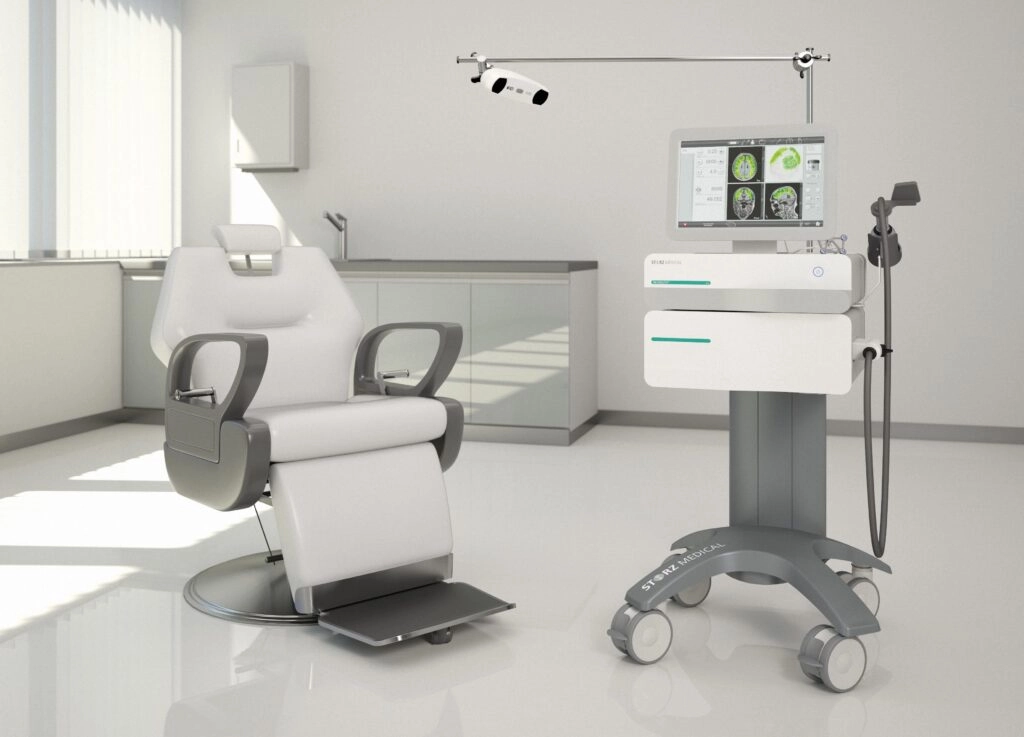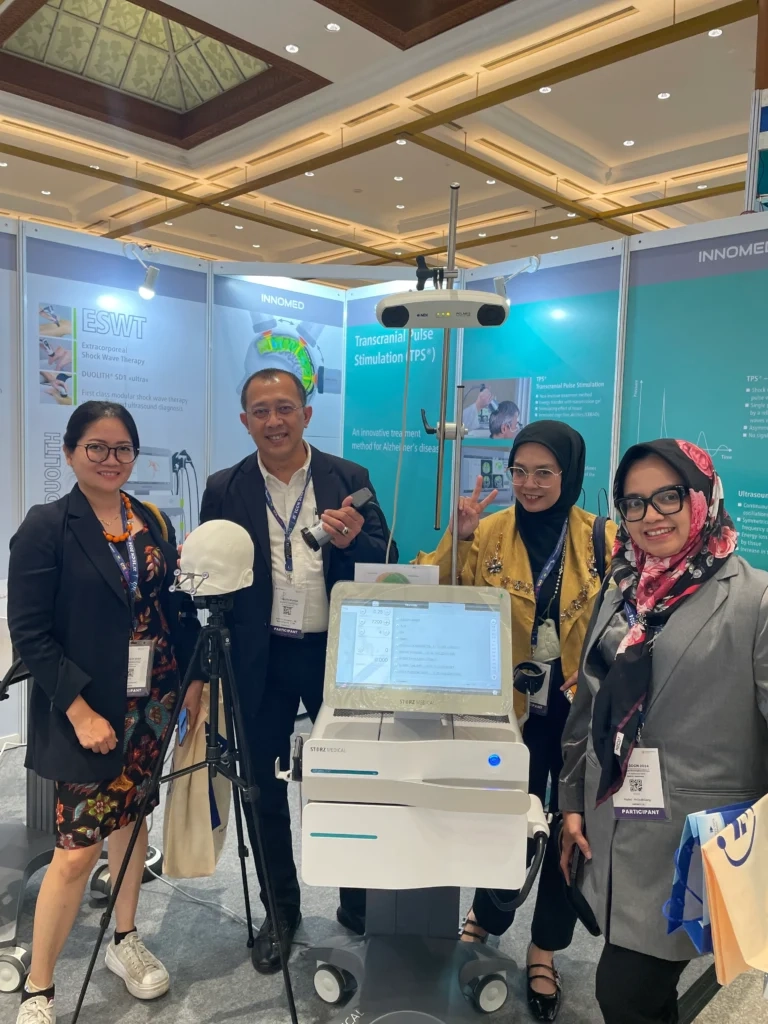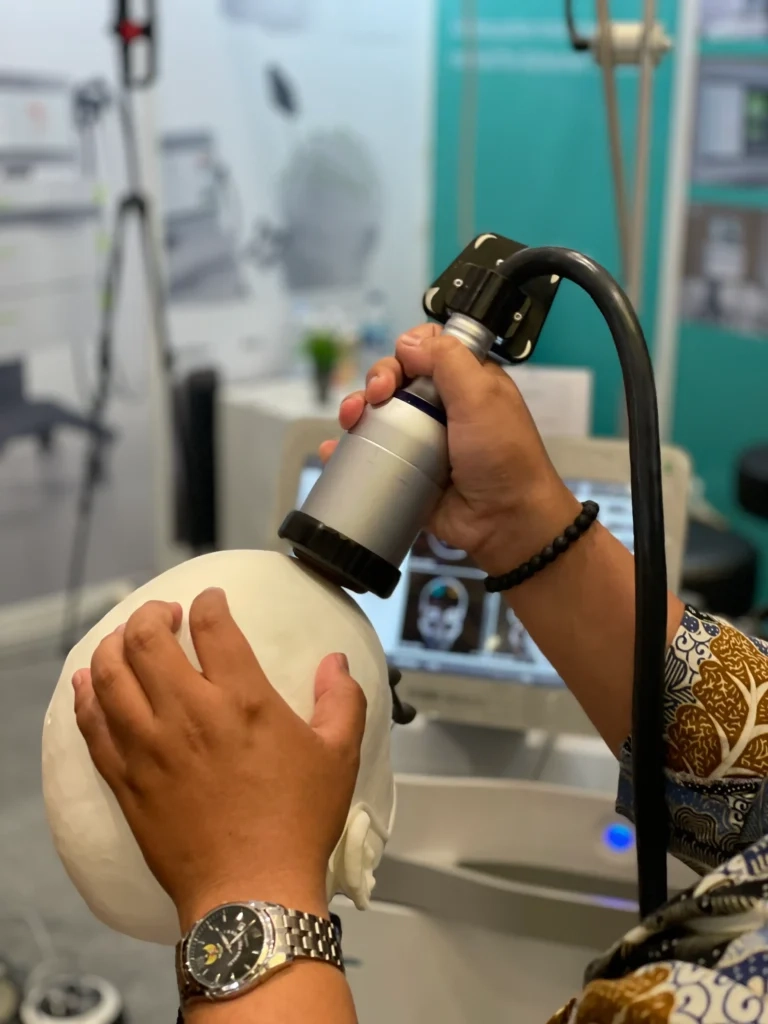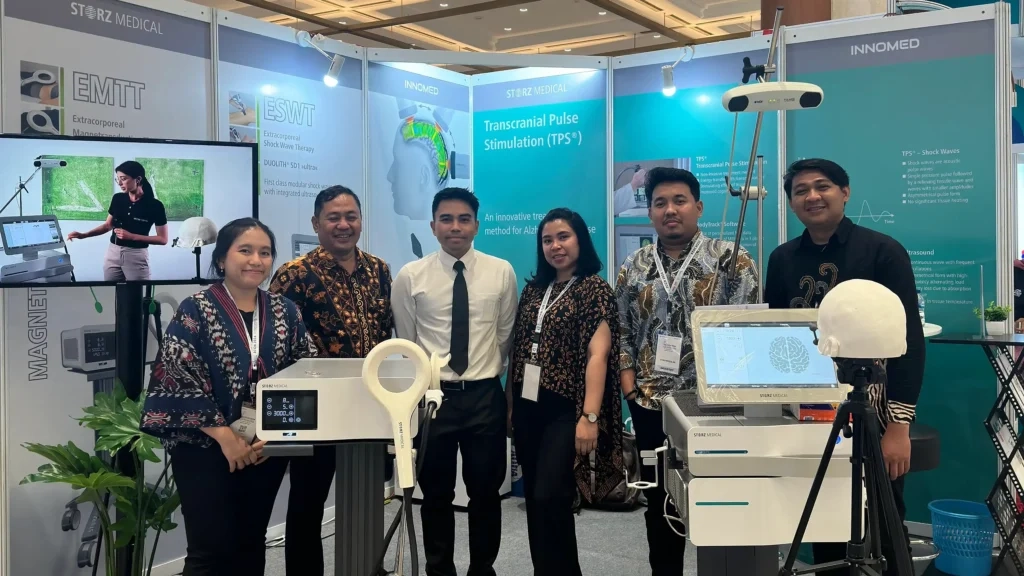International Congress of Clinical Neurophysiology (ICCN) 2024
The 33rd International Congress of Clinical Neurophysiology (ICCN) 2024, held from September 10th to 14th in Jakarta, Indonesia, was a pivotal event in the field of neurology. Organized by the International Federation of Clinical Neurophysiology (IFCN) and the Indonesian Neurological Association (INA), the congress brought together over 1,000 participants from more than 30 countries to discuss the latest advancements in clinical neurophysiology.
This neurology conference highlighted innovative neurostimulation techniques, including Transcranial Pulse Stimulation (TPS). This non-invasive method has shown promise in enhancing cognitive functions in patients with neurological disorders like Alzheimer’s disease. Devices such as Neurolith® (as seen in Image 1), which utilize TPS, were highlighted for their potential to improve patient outcomes by promoting neuroplasticity and increasing cerebral blood flow.

What is Alzheimer’s Disease?
Alzheimer’s disease is a progressive neurodegenerative disorder that is characterised by a gradual decline in memory and daily cognitive function. It is the most common form of dementia, at a prevalence of 4.8% in South East Asia, slightly higher that the global average at 4.7%.
How Beta-Amyloid Deposits Reduce Blood Flow in the Brain
Beta-amyloid deposits, a key feature of Alzheimer’s disease, play a significant role in disrupting the brain’s vascular system. These deposits impair cerebral blood flow (CBF), which is essential for delivering oxygen and nutrients to brain cells. The resulting reduction in blood supply contributes to cognitive decline and worsens dementia symptoms. Understanding how beta-amyloid affects blood flow is critical to developing effective treatments for Alzheimer’s and related conditions.
Mechanisms of Reduced Blood Flow
1. Vascular Amyloidosis
Beta-amyloid proteins can accumulate in the walls of small blood vessels, a condition known as cerebral amyloid angiopathy (CAA). This buildup leads to:
- Narrowing and stiffening of blood vessels, limiting their capacity to deliver adequate blood.
- Loss of elasticity, reducing the vessels’ ability to respond to changes in oxygen demand.
- Increased fragility, resulting in microbleeds that further compromise blood flow.
2. Endothelial Dysfunction
The endothelium, the thin layer of cells lining blood vessels, regulates blood flow and maintains the blood-brain barrier. Beta-amyloid deposits damage these cells, causing:
- Impaired vasodilation, where blood vessels fail to widen in response to increased demand for oxygen.
- Oxidative stress, as beta-amyloid triggers the production of harmful reactive oxygen species (ROS), further damaging the vascular system.
3.Neurovascular Uncoupling
In a healthy brain, blood flow increases in regions with higher neural activity (a process known as neurovascular coupling). Beta-amyloid disrupts this balance by:
- Damaging supporting cells like astrocytes and pericytes that regulate blood flow.
- Decreasing the responsiveness of blood vessels to neural signals, leading to an imbalance in blood distribution.
4. Chronic Inflammation
Beta-amyloid deposits trigger chronic inflammation in the brain. This inflammatory response:
- Narrows blood vessels, further reducing blood flow.
- Disrupts the blood-brain barrier, allowing harmful substances to penetrate the brain and exacerbate vascular injury.
5. Platelet Aggregation
Beta-amyloid promotes the clumping of platelets, leading to the formation of microclots in blood vessels. These clots obstruct blood flow, causing localized areas of oxygen deprivation, which can damage brain cells.
Implications for Alzheimer’s and Vascular Dementia
Beta-amyloid’s vascular effects create a significant link between Alzheimer’s disease and vascular dementia. Reduced blood flow exacerbates cognitive decline and leads to mixed dementia, where vascular and neurodegenerative conditions coexist. This overlap underscores the need for therapies that address both vascular health and beta-amyloid pathology.
Potential Interventions
Efforts to mitigate the impact of beta-amyloid on blood flow include:
- Targeting Beta-Amyloid: Monoclonal antibodies and other emerging therapies aim to reduce beta-amyloid plaques and improve blood flow.
- Improving Vascular Health: Managing risk factors like hypertension, diabetes, and high cholesterol protects blood vessels and brain health.
- Neuromodulation: Techniques such as Transcranial Pulse Stimulation (TPS) have shown promise in enhancing blood flow regulation and improving cognitive function.
Addressing beta-amyloid’s impact on blood flow is essential for tackling Alzheimer’s disease and related dementias.
The First Neurolith in Indonesia
Dr. Andri Anugerah [Sp.BS (K), M.Kes, FINPS], is a distinguished neurosurgeon at Rumah Sakit Pusat Angkatan Darat (RSPAD) Gatot Soebroto in Jakarta, Indonesia. With extensive expertise in diagnosing and surgically treating nervous system disorders, including the brain, spinal cord, and peripheral nerves, he is recognized for his contributions to neurosurgical advancements. Dr. Anugerah’s commitment to patient care and medical excellence has solidified his reputation as a leading figure in Indonesia’s medical community. With his foresight and experience on Alzheimer’s disease, Dr. Andri Anugerah became the first in Indonesia to acquire the Neurolith®. We were pleased to meet Dr. Andri Anugerah and group at ICCN 2024 and hope that with this initiative, Neurolith and TPS treatments will be readily available in Jakarta.

What is Neurolith?
Neurolith® is an advanced medical device based on Transcranial Pulse Stimulation (TPS), a cutting-edge technology designed to stimulate the brain non-invasively. Developed by Storz Medical, a leader in medical technology, Neurolith utilizes focused acoustic pulses to target specific regions of the brain.
The device is CE-certified for treating mild to moderate Alzheimer’s disease, making it a significant breakthrough in neurostimulation. By promoting neuroplasticity and enhancing brain perfusion, Neurolith has shown potential to slow the progression of cognitive decline.
Mechanism of Action:
- Acoustic Pulse Generation: The NEUROLITH® system generates acoustic pulses through its transducer or handpiece. These pulses are transmitted transcranially—non-invasively through the scalp and skull—into specific brain areas affected by neurological conditions.
- Mechanotransduction: The primary mechanism induced by TPS is mechanotransduction, where mechanical stimuli are converted into cellular responses. This process stimulates the release of growth factors, such as Vascular Endothelial Growth Factor (VEGF), enhancing cerebral blood flow, promoting angiogenesis (formation of new blood vessels), and supporting nerve regeneration.
- Nitric Oxide Release: TPS also facilitates the release of nitric oxide (NO), leading to vasodilation and improved blood circulation within the brain. This enhancement in blood flow is crucial for delivering oxygen and nutrients to neurons, potentially mitigating the progression of neurodegenerative diseases.

The Benefits of Neurolith for Alzheimer’s Patients
Neurolith offers several benefits that make it an attractive option for Alzheimer’s disease management:
- Non-Invasive Treatment: Unlike other neurostimulation methods that requiresurgical implants, Neurolith is entirely non-invasive, making it suitable for a broader patient population.
- Improved Cognitive Function: Clinical trials have shown measurable improvements in memory, attention, and executive function after TPS therapy.
- Minimized Side Effects: Patients undergoing TPS report minimal discomfort and no significant adverse effects, a critical advantage over pharmaceutical interventions.
- Enhanced Quality of Life: By preserving cognitive abilities, Neurolith allows patients to maintain independence for a longer period, reducing the burden on caregivers.
Clinical Evidence: A Game Changer for Alzheimer’s Treatment
Several studies have demonstrated the efficacy of Neurolith in treating Alzheimer’s disease. In one pivotal trial, patients receiving TPS therapy experienced:
- Significant improvement in cognitive test scores.
- Sustained benefits up to six months post-treatment.
- No safety concerns, making it a low-risk therapeutic option.
These results highlight Neurolith’s potential as an adjunct therapy for Alzheimer’s disease, complementing existing treatments like cholinesterase inhibitors and lifestyle interventions.
The Future of Neurolith in Alzheimer’s Care
Neurolith represents a paradigm shift in the management of Alzheimer’s disease. By addressing the underlying mechanisms of neurodegenerative disorders, it offers a unique approach that goes beyond symptomatic relief. As research continues, Neurolith could pave the way for broader applications in neurodegenerative disorders.
Final Thoughts
For patients and families navigating the challenges of Alzheimer’s, the Neurolith brings renewed hope. Its innovative use of Transcranial Pulse Stimulation is not only a testament to the power of technology in medicine but also a beacon for those seeking solutions to one of healthcare’s most pressing problems.

If you or a loved one is struggling with Alzheimer’s disease, talk to a healthcare provider about Neurolith. The future of treatment may just be a pulse away.
Disclaimer: This article is for informational purposes only and should not replace professional medical advice. Always consult a healthcare professional before considering new treatments.

